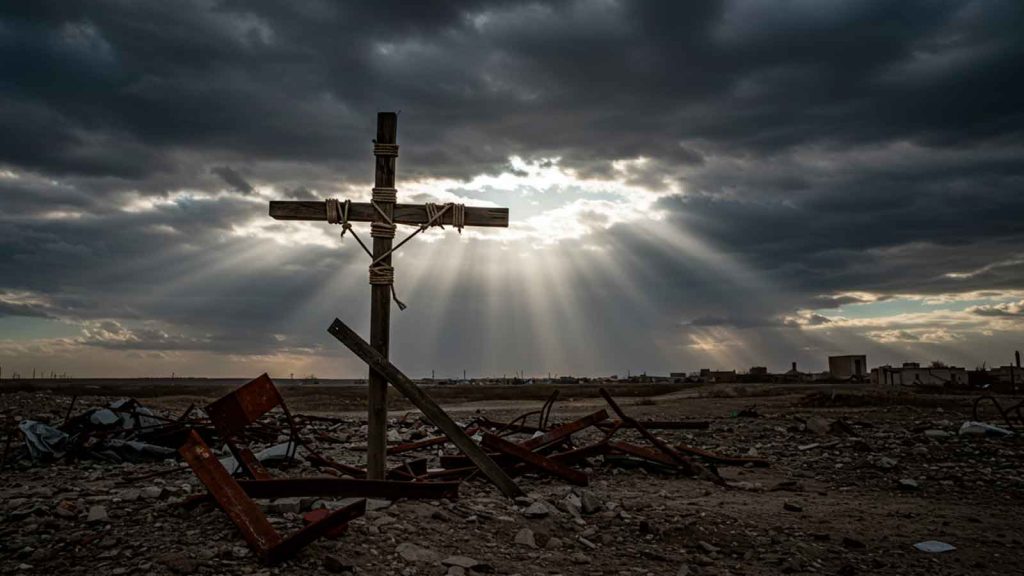What the Bible Says About Wars
What the Bible Says About Wars is a question that echoes even louder in the face of today’s conflicts. With rising tension in the Middle East, armed invasions in different parts of the world, and the constant threat of new global clashes, many Christians seek to understand whether there is biblical support for such events—and how to position themselves in light of them. The Bible, with its vast collection of historical accounts and moral guidance, continues to shed light on how to interpret the dark days we are living.
In this article we will explore what the main biblical texts say about war, peace, judgment, and hope. Understanding what the Bible says about wars is essential for anyone who wants to reflect on the course of humanity from a spiritual and ethical perspective.

Modern Conflicts and the Role of Faith: What the Scriptures Reveal
Why Does War Remain a Reality in the 21st Century?
Even after two world wars, humanity keeps repeating cycles of violence. Civil wars, terrorist attacks, and geopolitical disputes show that the world still lives in a climate of instability. In the midst of this, the search for spiritual and historical explanations grows. After all, what the Bible says about wars in such turbulent times is a pressing question.
The Bible is not indifferent to conflicts. From the Old Testament to the teachings of Jesus, we find accounts of physical battles and spiritual confrontations. Yet it also points to paths of reconciliation and peace, revealing that the end of war is possible—but it begins with inner transformation.
The Biblical View of Wars Between Nations
In the Old Testament, wars were often seen as instruments of judgment or protection. Israel’s military campaigns were led by a just God who judged nations corrupted by oppression and idolatry. Yet throughout the prophetic texts—especially in Isaiah and Micah—a promise of a future without wars begins to emerge, resonating strongly with today’s hope for global peace.
What the Bible Says About Wars and the Use of Force
Does the Bible Support Wars?
The answer depends on context. There are moments in which Scripture describes conflicts as instruments of divine justice. In others, the Bible presents war as a direct result of human rebellion, greed, and lovelessness.
Passages such as Deuteronomy 20 offer guidelines for conflict: offer peace before attacking, protect civilians, do not destroy natural resources. This shows that even in ancient times war was not encouraged irresponsibly—an important point when ethics are discussed amid today’s international crises.
War and Justice: When Is It Permitted to Fight?
The concept of “just war,” later articulated by Christian theologians like Augustine and Thomas Aquinas, rests on biblical principles: just cause, moral intent, legitimate authority, and proportionality. Thus, what the Bible says about wars can serve as a basis for reflecting on the legitimacy of current conflicts, provided they are examined with ethical and spiritual discernment.

Jesus and the Radical Proposal of Peace
“Love Your Enemies”: A Revolutionary Response
In the Sermon on the Mount (Matthew 5), Jesus breaks paradigms by teaching that violence should not be repaid with violence. “Blessed are the peacemakers” and “Love your enemies” are not idealistic slogans but invitations to a new mindset. When wars are destroying homes and families today, these words become even more challenging and relevant.
Jesus also rebukes Peter for drawing his sword at the moment of His arrest, showing that the way of God’s Kingdom does not rely on weapons but on love. This does not deny the reality of evil, but it points to another way of confronting it.
Spiritual Warfare: The Real Battle
Ephesians 6 reminds us that the main battle is not against people but against spiritual forces of evil. This redefines the battlefield: the fight is now for truth, justice, and faith. In the face of fake news, hate speech, and polarization, this spiritual warfare is more evident than ever.
Biblical Prophecies and the End of Wars
Swords Will Be Beaten Into Plowshares
Isaiah 2:4 offers one of the Bible’s most beautiful images of hope: the nations will “beat their swords into plowshares.” It is a prophecy of a time when war will be unnecessary. This vision even inspired sculptures in front of the UN headquarters. In a world filled with tension, it is one of the greatest comforts that what the Bible says about wars can provide.
The End Times and Ultimate Justice
Revelation presents Christ as the warrior who defeats evil—not through blind destruction but through perfect justice. Armageddon is not an incentive to fear; it is the guarantee that one day all evil will be vanquished and peace will reign.

The Christian Stance Amid Current Conflicts
What Should We Do in the Face of Today’s Wars?
The Bible calls us to action:
- Pray for peace among nations (Psalm 122:6)
- Care for refugees and war victims
- Promote justice and reconciliation within our spheres of influence
- Reject hate speech, even against the “enemy”
Thus, reflecting on what the Bible says about wars is not only looking to the past but engaging the present with faith and responsibility.
The Church as an Agent of Peace in the Modern World
Many Christian organizations today operate in war zones, providing relief and mediating between conflicting peoples. This work is directly based on biblical teachings. In times like ours, the Church’s role as a voice of peace has never been more necessary.
Frequently Asked Questions About What the Bible Says About Wars
1. Does the Bible approve any kind of war?
Yes, in very specific contexts—such as self-defense or judgment against unjust practices—but always within ethical limits.
2. Did Jesus condemn every form of war?
He condemned violence as a method for establishing God’s Kingdom. His focus is the transformation of the heart.
3. Is spiritual warfare literal?
No. It is an inner battle against evil that manifests in attitudes, thoughts, and unjust structures.
4. What should a Christian do in times of war?
Pray, act compassionately, promote truth, and be an example of peace and courage.
5. How can we apply Isaiah 2:4 today?
By encouraging reconciliation, advocating peace-building policies, and acting wisely amid polarization.
Conclusion: Is Peace Possible?
What the Bible says about wars goes far beyond physical battles. The Bible recognizes the reality of war but points to a future in which it will no longer be necessary. In a world scarred by conflicts, this message is more urgent than ever.
The Bible calls us not to run from problems but to face them with courage, ethics, and faith—and reminds us that peace begins with each of us, with our choices, words, and prayers.
READ ALSO:
- Psalm 113: The Exaltation of the Name of the Lord
- Corpus Christi: Tradition, Meaning and Celebrations
- Psalm 110: The Prophecy of the Messiah King and Priest
FOLLOW US ON FACEBOOK